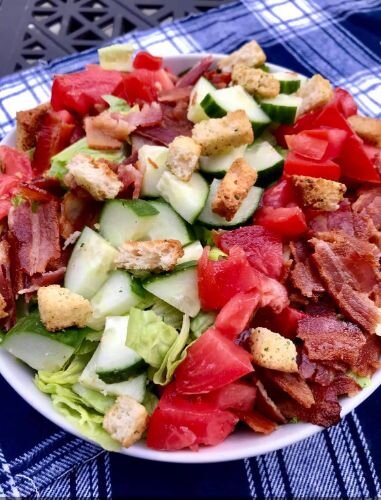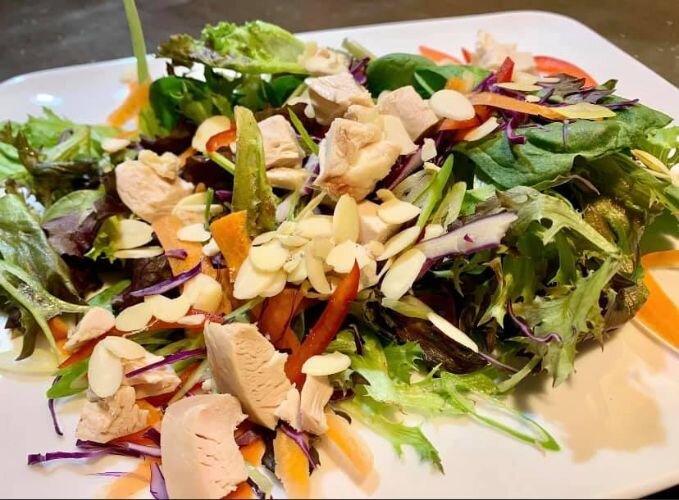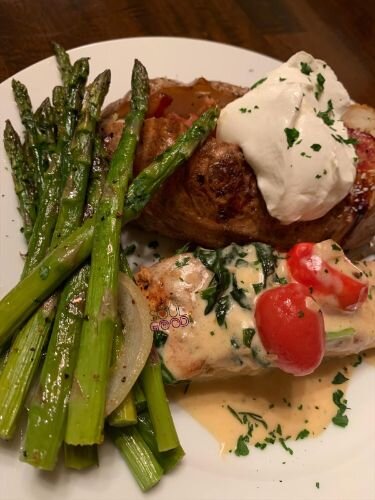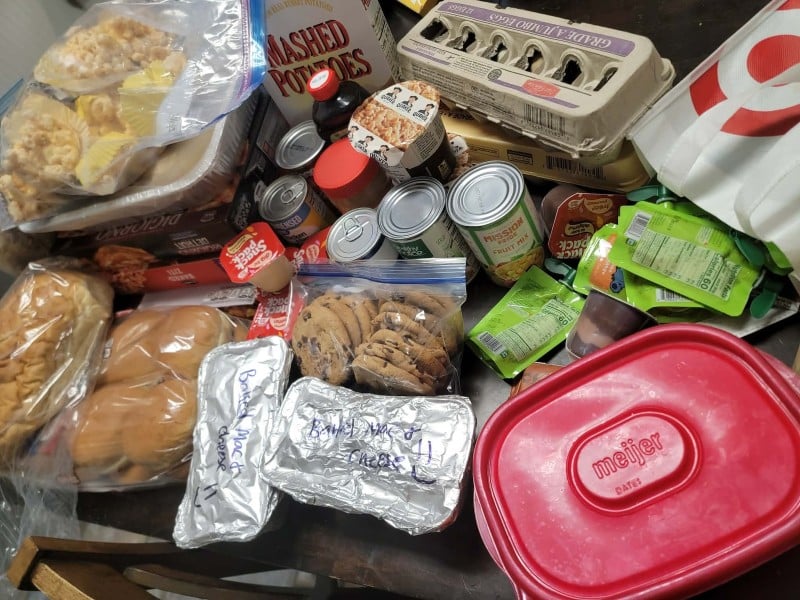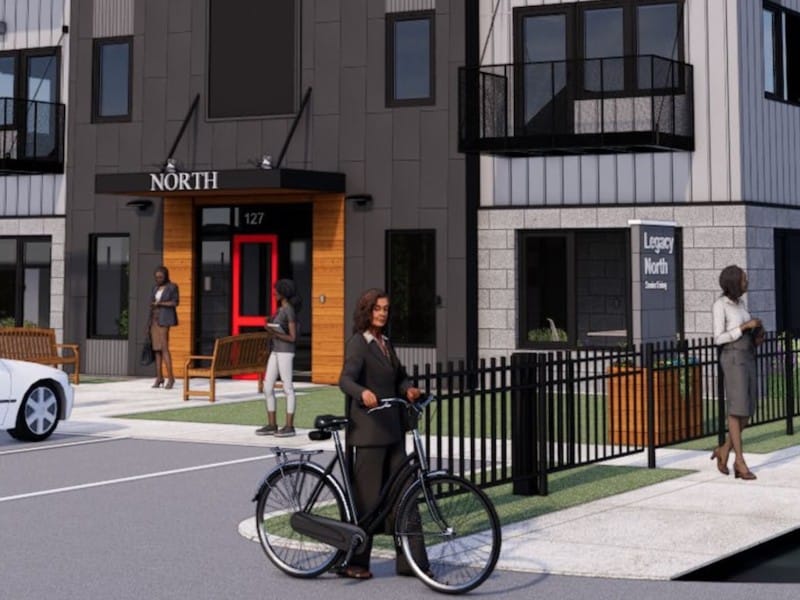Battle Creek restaurants adopt Ghost Kitchen concept as pandemic inspires new ways of doing business
A restaurant concept that started before the pandemic has taken off as restaurateurs look for new ways to provide safe and convenient service to customers. Here are two Battle Creek chefs that are finding success with ghost kitchens.
Editor’s note: This story is part of Southwest Michigan Second Wave’s On the Ground Battle Creek series.
Chefs in Battle Creek are embracing a foodservice concept that experienced substantial growth in March 2020, when the pandemic sent them and restaurant owners in search of new ways to satisfy the growing appetite of patrons for safer and more convenient dining out experiences.
Known as Ghost Kitchens, the concept has been embraced locally by at least two chefs, including Steve Deal and Deja (Da-Jay) Wilson. Deal is a Culinary Instructor at the Calhoun Area Career Center and co-owns Fearless Foods Soup Station with his wife, Angela. Wilson is the owner of Soul Good LLC.

They are examples of smaller-scale ghost kitchens — spaces rented from an existing licensed kitchen where orders are taken online for a specific time period or until they sell out, whichever comes first. The orders are available only for pick-up or delivery because the spaces where they operate are intentionally designed to have no customers in them.
Wilson will get her start as a ghost kitchen this fall at the Calhoun Street location that was the former site of Umami Ramen. The move comes after she had outgrown the kitchen incubator space she had been working in. Deal and his wife decided to give the Ghost Kitchen concept a try about three years ago and began renting space at Continental Pastries from the owner, Janna Nunn.
“This is a concept,” Deal says, “that I read about and people were doing this in Chicago and all of the big markets. People were renting out space from restaurants in the evening.”
“My wife knows I’m not happy if I’m not cooking,” says Deal, former Executive Chef at the Battle Creek Country Club. “She said, ‘You make such good soups, you should start a soup business.’”
Since founding Fearless Foods, they have been making two different soups on Saturday evenings after Continental Pastries closes for the day. They establish a set amount of each variety, which customers can order in advance until it sells out. In addition to the soup, customers can purchase a salad of the week also made by Deal and loaves of bread baked by Nunn and her team. Deal and his crew deliver the meals on Sundays.

During peak soup-eating season in colder weather months, Deal, his wife, their children and a few others typically make 15 gallons each of soups like cream of mushroom or broccoli and cheddar, sold by the quart. This equates to about 60 quarts of soup and if there is any remaining at the end of the weekend, Nunn sells it at Continental.
“We try to collaborate together,” Deal says of his relationship with Nunn.
That relationship has grown to include Mid-Week Meal Deal and Sunday Supper packages and the former Cool Mama’s ice cream shop that was renting space at Continental.
“Last year May. I really wanted to have someone offering ice cream, even if we had to do it through a drive-up window,” Nunn says. “I asked Steve. He was already licensed so all he had to do was buy the product and move in. He has a license through our business and our building.”
For health reasons that would have been exacerbated by COVID, the owner of Cool Mama’s had decided to close the business. Then, working with Deal, the ice cream business re-opened during the 2020 Memorial Day weekend.
The Mid-Week and Sunday Supper packages, which include a salad, entrée, and dessert prepared by Deal and his team when Continental is closed, were opportunities Deal pursued when the pandemic first started and will be available again after the ice cream shop closes for the season in September.
Nunn says her business venture is now helping others as others helped her when she was starting out. A native of the Netherlands, Nunn moved to Battle Creek in 1985 with her husband who had taken a job at the Hart-Dole-Inouye Federal Center. She took a job at Continental Pastries and eventually decided to purchase the business from the original owners Helga and Fred Kramm.
“It was really hard to get the money I needed to purchase the business. I didn’t have much of a track record here and I needed a down payment and I had to borrow in increments from different people,” Nunn says. “I knew if I wanted to get in and buy the business, I needed to come up with the money because banks didn’t want to take the risk. When I started out there were people who helped me to get in business. It’s almost impossible today to do it on your own, especially if you’re starting with nothing.”
In 1992, Nunn became Continental’s new owner.
Outgrowing the kitchen incubator
The average cost to open a restaurant is $375,500, according to a Restaurant Owners’ survey. However, expenses will vary depending on location, size, and a range of other decisions you’ll make along the way, according to an article on the blueprint.
About 60 percent of new restaurants fail within the first year. And nearly 80 percent shutter before their fifth anniversary, according to an article on the CNBC website Make It.
Given these statistics and the number of restaurants that have closed during the pandemic, ghost kitchens make a lot of sense, says John Hart, Small Business Development Director for the city of Battle Creek.

“It’s not for everyone, especially if you’ve got a lack of brick-and-mortar kitchen space in a community. But it sure beats the costs associated with opening a traditional restaurant,” Hart says. “I think the ghost kitchen concept really took off pre-pandemic, but the pandemic showed that it’s here to stay. With the advent of businesses like Uber Eats and Grubhub, it showed that you don’t need a brick-and-mortar location.”
Wilson learned this very quickly. She began preparing meals under her Soul Food LLC banner On February 28 at an incubator kitchen at Sprout in Springfield. “I outgrew the Sprout kitchen very fast,” Wilson says. “I actually planned on being there for one year.”
In mid- to late-September, her business will expand using a ghost kitchen concept in a building at Calhoun Street that was the former site of Umami Ramen.
After conversations with Peecoon Allen, owner of Umami Ramen, which relocated to a bigger space at 215 W. Michigan Avenue, Wilson entered into an agreement to lease the former Umami Ramen location.
Small Business Development Director Hart says that Allen followed a similar trajectory as she grew her business and is a great coach and mentor as well as a landlord to Wilson.
At the end of February Wilson began taking orders for meals that are based on her own “high-class soul food” concept. Customers soon learned there was nothing ordinary about the Cornish hens or Hennessey-glazed lamb chops or birria tacos they were eating and enjoying.

Wilson has taken what she learned from time spent in the kitchen as a youngster with her grandmother, countless Food Network episodes, training she received while studying Culinary Arts at the Calhoun Area Career Center, and on-the-job experience to create food that has sold out since she first started her business at Sprout.
Her menus for Saturday and Sunday pick-up are posted on Wednesdays on her website.
“They pick the meal items and the time they want to pick it up,” Wilson says. “In the beginning, I was preparing 100 meals each for Saturday or Sunday pick-up. I cut that down to 45 orders each day because I’m the one doing the cooking and I wanted to really focus on what I was preparing.”
Depending on what is being offered on a particular weekend, there could be side dishes, a drink or a dinner roll, as is the case with the Cornish hen meal, or a standalone meal item like the tacos. The Cornish hens, tacos, lamb chops and pot roast are her most popular menu features.
Her weekend-only operation was borne out of necessity. She says the Sprout kitchen and building are occupied by others on weekdays and she needed more space than what was available during the week.

“Saturdays and Sundays are full days for Soul Good,” says Wilson who may begin prepping and cooking as early as 4 a.m. depending on the entrée. “Family members and friends volunteer and help me out, but the majority of the cooking and setting the menus is all me.”
Those lucky enough to get their order in before it sells out, may pick times between 3 p.m. and 5 p.m. to pick up their food.
While set pick-times will be in play at her new location, just about everything else will be expanded, including, she hopes, her current one-person staff.
“In the beginning I plan to be open for ordering and pick-up Thursday through Sunday so I have Monday, Tuesday and Wednesday to do the prep work,” Wilson says. “I will get more help, but since I’m keeping it small and ordering will be online or available through the EatsBC system, I won’t need a lot of employees. I will have more hours available for pick-up, maybe 10 a.m. to 6 or 7 p.m. which will give customers more of a window.”
New and necessary ways to achieve success
Wilson says she likes the ghost kitchen concept because of the safety it affords business owners and customers.
“It’s really the best and safest thing for everybody,” she says. “No one’s entering the building, you have curbside pickup, and another great thing is that people will know exactly what time their meal will be ready which is especially good for families who are pre-ordering meals for a particular day.”
For Deal, renting space gives him the ability to practice his culinary talents without having to pay costs associated with overhead or having to throw away food.
“It’s wonderful to know by noon on Saturday exactly how much food I need to prepare. If I buy 20 pounds of salmon, I know I’ll sell it all.”
The way the pandemic and changing lifestyles and habits have changed the eating behaviors of the American public is a trend that will continue, he says.
“In 2000, about 10 percent of what we saw was takeout for restaurants. In 2010 that rose to 22 percent,” Deal says. “Most families are dual-income families and they don’t have the time to make a sit-down meal, but they still want that family meal at the table. By 2020, what I was hearing is that take-out orders would be up to 30 percent. Since the pandemic, more people are apt to pick up a meal and take it home. I don’t see it going down. More and more restaurants are savvy enough and they’ve embraced it.”
Hart says the more than 30 local restaurants and eateries that are part of the EatsBC coalition are experiencing the increases that Deal cites. He says since the online ordering platform debuted around Easter, 2020, monthly revenues have continued on an upward trajectory.
Six months after the site launched, Hart says traffic “really picked up. We are creating $100,000 of revenue each month for these restaurants. Essentially, when you think about it that’s $100,000 plus per month that’s being generated. We’re beyond $800,000 in total being generated.”
The beauty of EatsBC, Hart says, is that it’s a virtual real-time catalog of available food options in Battle Creek with the added benefit of a delivery option.
The onset of the pandemic saw many of these restaurants joining those throughout the United States in implementing online ordering and pick-up or delivery options, but it also found customers becoming more at ease with using technology as a way to enjoy a meal they didn’t have to prepare.
“Because they were in the midst of a pandemic and closed for indoor dining, the goal for many restaurants was to keep people off the phones because they didn’t have enough staff and couldn’t spend time taking orders in addition to preparing the food,” Hart says. “With EatsBC, we were trying to create efficiencies for the restaurants and put the ownness on someone else to pick up or deliver the food. It also encouraged more people to get on the Internet. People don’t mind eating a restaurant-prepared meal at home.”
He says people in the Battle Creek area also have gotten used to the idea of outdoor dining and have used the city’s downtown social district to enjoy a drink or a meal while socializing with others.
With COVID cases, including those involving the Delta variant, are on the rise, Hart says there are concerns about possible mandates being put in place.
“Everyone is waiting to see what’s going to happen in the fall and winter. Everyone is anticipating the worse and preparing for that, but restaurants are saying that if their staff and clients feel safer in masks, they are encouraging them to wear them,” Hart says. “Most of them are all trying to work safe. None of them want to be mandated to do these things because they feel like it impacts their bottom-line. All of them are reporting shortages in staff and altering their hours of operation and menus. In some cases, in the downtown area, they’re picking and choosing when they’re participating in events and asking us to limit their exposure at events.”
However, there has been no specific messaging regarding masks or vaccinations and Hart says restaurants need to remain neutral because their customers represent both sides of the mask and vaccination debates. He says they should try to remain neutral and safe and offer options to those who want to wear masks and those who don’t.
“It’s their livelihood so most of them don’t want regulations or one regulation that they all have to fall under. Everyone’s hopeful that folks are going to get vaccinated, wear masks and social distance,” Hart says. “We will all get through it. If limits are put back in place, we’ll take it as it comes and pivot.”
Chefs in Battle Creek are embracing a food service concept that experienced substantial growth in March, 2020, when the pandemic sent them and restaurant owners in search of new ways to satisfy the growing appetite of patrons for a safer and more convenient dining out experience.
Known as Ghost Kitchens, the concept has been embraced locally by at least two chefs, including Steve Deal and Deja (Da-Jay) Wilson. Deal is a Culinary Instructor at the Calhoun Area Career Center and co-owns Fearless Foods Soup Station with his wife, Angela. Wilson is the owner of Soul Good LLC.
They are examples of smaller-scale ghost kitchens — spaces rented from an existing licensed kitchen where orders are taken online for a specific time period or until they sell out, whichever comes first. The orders are available only for pick-up or delivery because the spaces where they operate are intentionally designed to have no customers in them.
Wilson will get her start as a ghost kitchen this fall at Calhoun Street location that was the former site of Umami Ramen. The move comes after she had outgrown the kitchen incubator space she had been working in. Deal and his wife decided to give the Ghost Kitchen concept a try about three years ago and began renting space at Continental Pastries from owner, Janna Nunn.
“This is a concept,” Deal says, “that I read about and people were doing this in Chicago and all of the big markets. People were renting out space from restaurants in the evening.”
About three years ago, Deal and his wife decided to give it a try and began renting space at Continental Pastries from owner, Janna Nunn.
“My wife knows I’m not happy if I’m not cooking,” says Deal, former Executive Chef at the Battle Creek Country Club. “She said, ‘You make such good soups, you should start a soup business.’”
Since founding Fearless Foods, they have been making two different soups on Saturday evenings after Continental Pastries closes for the day. They establish a set amount of each variety, which customers can order in advance until it sells out. In addition to the soup, customers can purchase a salad of the week also made by Deal and loaves of bread baked by Nunn and her team. Deal and his crew deliver the meals on Sundays.
During peak soup-eating season in colder weather months, Deal, his wife, their children and a few others typically make 15 gallons each of soups like cream of mushroom or broccoli and cheddar, sold by the quart. This equates to about 60 quarts of soup and if there is any remaining at the end of the weekend, Nunn sells it at Continental.
“We try to collaborate together,” Deal says of his relationship with Nunn.
That relationship has grown to include Mid-Week Meal Deal and Sunday Supper packages and the former Cool Mama’s ice cream shop that was renting space at Continental.
“Last year May. I really wanted to have someone offering ice cream, even if we had to do it through a drive-up window,” Nunn says. “I asked Steve. He was already licensed so all he had to do was buy the product and move in. He has a license through our business and our building.”
For health reasons that would have been exacerbated by COVID, the owner of Cool Mama’s had decided to close the business. Then, working with Deal, the ice cream business re-opened during the 2020 Memorial Day weekend.
The Mid-Week and Sunday Supper packages, which include a salad, entrée, and dessert prepared by Deal and his team when Continental is closed, were opportunities Deal pursued when the pandemic first started and will be available again after the ice cream shop closes for the season in September.
Nunn says her business venture is now helping others as others helped her when she was starting out. A native of the Netherlands, Nunn moved to Battle Creek in 1985 with her husband who had taken a job at the Hart-Dole-Inouye Federal Center. She took a job at Continental Pastries and eventually decided to purchase the business from the original owners Helga and Fred Kramm.
“It was really hard to get the money I needed to purchase the business. I didn’t have much of a track record here and I needed a down payment and I had to borrow in increments from different people,” Nunn says. “I knew if I wanted to get in and buy the business, I needed to come up with the money because banks didn’t want to take the risk. When I started out there were people who helped me to get in business. It’s almost impossible today to do it on your own, especially if you’re starting with nothing.”
In 1992, Nunn became Continental’s new owner.
Outgrowing the kitchen incubator
The average cost to open a restaurant is $375,500, according to a Restaurant Owners’ survey. However, expenses will vary depending on location, size, and a range of other decisions you’ll make along the way, according to an article on the blueprint.
About 60 percent of new restaurants fail within the first year. And nearly 80 percent shutter before their fifth anniversary, according to an article on the CNBC website Make It.
Given these statistics and the number of restaurants that have closed during the pandemic, ghost kitchens make a lot of sense, says John Hart, Small Business Development Director for the city of Battle Creek.
“It’s not for everyone, especially if you’ve got a lack of brick-and-mortar kitchen space in a community. But it sure beats the costs associated with opening a traditional restaurant,” Hart says. “I think the ghost kitchen concept really took off pre-pandemic, but the pandemic showed that it’s here to stay. With the advent of businesses like Uber Eats and Grubhub, it showed that you don’t need a brick-and-mortar location.”
Wilson learned this very quickly. She began preparing meals under her Soul Food LLC banner On February 28 at an incubator kitchen at Sprout in Springfield. “I outgrew the Sprout kitchen very fast,” Wilson says. “I actually planned on being there for one year.”
In mid- to late-September, her business will expand using a ghost kitchen concept in a building at Calhoun Street that was the former site of Umami Ramen.
After conversations with Peecoon Allen, owner of Umami Ramen, which relocated to a bigger space at 215 W. Michigan Avenue, Wilson entered into an agreement to lease the former Umami Ramen location.
Small Business Development Director Hart says that Allen followed a similar trajectory as she grew her business and is a great coach and mentor as well as a landlord to Wilson.
At the end of February Wilson began taking orders for meals that are based on her own “high-class soul food” concept. Customers soon learned there was nothing ordinary about the Cornish hens or Hennessey-glazed lamb chops or birria tacos they were eating and enjoying.
Wilson has taken what she learned from time spent in the kitchen as a youngster with her grandmother, countless Food Network episodes, training she received while studying Culinary Arts at the Calhoun Area Career Center, and on-the-job experience to create food that has sold out since she first started her business at Sprout.
Her menus for Saturday and Sunday pick-up are posted on Wednesdays on her website.
“They pick the meal items and the time they want to pick it up,” Wilson says. “In the beginning, I was preparing 100 meals each for Saturday or Sunday pick-up. I cut that down to 45 orders each day because I’m the one doing the cooking and I wanted to really focus on what I was preparing.”
Depending on what is being offered on a particular weekend, there could be side dishes, a drink or a dinner roll, as is the case with the Cornish hen meal, or a standalone meal item like the tacos. The Cornish hens, tacos, lamb chops and pot roast are her most popular menu features.
Her weekend-only operation was borne out of necessity. She says the Sprout kitchen and building are occupied by others on weekdays and she needed more space than what was available during the week.
“Saturdays and Sundays are full days for Soul Good,” says Wilson who may begin prepping and cooking as early as 4 a.m. depending on the entrée. “Family members and friends volunteer and help me out, but the majority of the cooking and setting the menus is all me.”
Those lucky enough to get their order in before it sells out, may pick times between 3 p.m. and 5 p.m. to pick up their food.
While set pick-times will be in play at her new location, just about everything else will be expanded, including, she hopes, her current one-person staff.
“In the beginning I plan to be open for ordering and pick-up Thursday through Sunday so I have Monday, Tuesday and Wednesday to do the prep work,” Wilson says. “I will get more help, but since I’m keeping it small and ordering will be online or available through the EatsBC https://eatsbc.com/en/ system, I won’t need a lot of employees. I will have more hours available for pick-up, maybe 10 a.m. to 6 or 7 p.m. which will give customers more of a window.”
New and Necessary Ways to Achieve Success
Wilson says she likes the ghost kitchen concept because of the safety it affords business owners and customers.
“It’s really the best and safest thing for everybody,” she says. “No one’s entering the building, you have curbside pickup, and another great thing is that people will know exactly what time their meal will be ready which is especially good for families who are pre-ordering meals for a particular day.”
For Deal, renting space gives him the ability to practice his culinary talents without having to pay costs associated with overhead or having to throw away food.
“It’s wonderful to know by noon on Saturday exactly how much food I need to prepare. If I buy 20 pounds of salmon, I know I’ll sell it all.”
The way the pandemic and changing lifestyles and habits have changed the eating behaviors of the American public is a trend that will continue, he says.
“In 2000, about 10 percent of what we saw was takeout for restaurants. In 2010 that rose to 22 percent,” Deal says. “Most families are dual-income families and they don’t have the time to make a sit-down meal, but they still want that family meal at the table. By 2020, what I was hearing is that take-out orders would be up to 30 percent. Since the pandemic, more people are apt to pick up a meal and take it home. I don’t see it going down. More and more restaurants are savvy enough and they’ve embraced it.”
Hart says the more than 30 local restaurants and eateries that are part of the EatsBC coalition are experiencing the increases that Deal cites. He says since the online ordering platform debuted around Easter, 2020, monthly revenues have continued on an upward trajectory.
Six months after the site launched, Hart says traffic “really picked up. We are creating $100,000 of revenue each month for these restaurants. Essentially, when you think about it that’s $100,000 plus per month that’s being generated. We’re beyond $800,000 in total being generated.”
The beauty of EatsBC, Hart says, is that it’s a virtual real-time catalog of available food options in Battle Creek with the added benefit of a delivery option.
The onset of the pandemic saw many of these restaurants joining those throughout the United States in implementing online ordering and pick-up or delivery options, but it also found customers becoming more at ease with using technology as a way to enjoy a meal they didn’t have to prepare.
“Because they were in the midst of a pandemic and closed for indoor dining, the goal for many restaurants was to keep people off the phones because they didn’t have enough staff and couldn’t spend time taking orders in addition to preparing the food,” Hart says. “With EatsBC, we were trying to create efficiencies for the restaurants and put the ownness on someone else to pick up or deliver the food. It also encouraged more people to get on the Internet. People don’t mind eating a restaurant-prepared meal at home.”
He says people in the Battle Creek area also have gotten used to the idea of outdoor dining and have used the city’s downtown social district to enjoy a drink or a meal while socializing with others.
With COVID cases, including those involving the Delta variant, are on the rise, Hart says there are concerns about possible mandates being put in place.
“Everyone is waiting to see what’s going to happen in the fall and winter. Everyone is anticipating the worse and preparing for that, but restaurants are saying that if their staff and clients feel safer in masks, they are encouraging them to wear them,” Hart says. “Most of them are all trying to work safe. None of them want to be mandated to do these things because they feel like it impacts their bottom-line. All of them are reporting shortages in staff and altering their hours of operation and menus. In some cases, in the downtown area, they’re picking and choosing when they’re participating in events and asking us to limit their exposure at events.”
However, there has been no specific messaging regarding masks or vaccinations and Hart says restaurants need to remain neutral because their customers represent both sides of the mask and vaccination debates. He says they should try to remain neutral and safe and offer options to those who want to wear masks and those who don’t.
“It’s their livelihood so most of them don’t want regulations or one regulation that they all have to fall under. Everyone’s hopeful that folks are going to get vaccinated, wear masks and social distance,” Hart says. “We will all get through it. If limits are put back in place, we’ll take it as it comes and pivot.”


